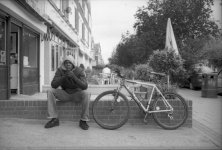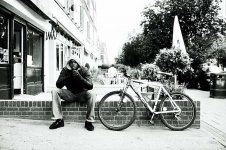boy_lah
Discovering RF
hi, been lurking here a while now but this is my first post.
i've recently starting shooting film again and been using my local independent lab here in SW London to develop & scan my pix (no prints).
All the pix seems lovely except a tad on the high contrast side. Everything is very black or very white. I don't get that grey tones that i see from other people's pix. Initially i though it may be the film i've been using so i tried different ones (Delta, FP4+ and TMAX, also ASA100 and 400). Subtle differences aside, i'm pretty much getting the same thing. Pls check out my Flickr page for samples
My local lab uses Rodinal @ 25(?) whatever that means and scans using the minilab.
On one ocassion he had to re-scan a pix for me using his Epson flatbed and i got very different results - and that got me thinking.
The 'grey' faded looking one is from the Epson flatbed. The high contrast one is from the minilab. Neither has been digitally retouched (just resize). Neither is that great but the difference in output is what intrigued me.
So...my questions are:
- what do you think of the high contrast pix (and those on my flickr)? is this normal?
- am i'm missing out on the benefits of different film characteristics since diff films seems the same with this lab?
- should I should try a different lab?
- finally, can anyone in UK recommend a good mail order lab or one in town/SW London for B&W as well as C41 colour negs?
thanks in advance
i've recently starting shooting film again and been using my local independent lab here in SW London to develop & scan my pix (no prints).
All the pix seems lovely except a tad on the high contrast side. Everything is very black or very white. I don't get that grey tones that i see from other people's pix. Initially i though it may be the film i've been using so i tried different ones (Delta, FP4+ and TMAX, also ASA100 and 400). Subtle differences aside, i'm pretty much getting the same thing. Pls check out my Flickr page for samples
My local lab uses Rodinal @ 25(?) whatever that means and scans using the minilab.
On one ocassion he had to re-scan a pix for me using his Epson flatbed and i got very different results - and that got me thinking.
The 'grey' faded looking one is from the Epson flatbed. The high contrast one is from the minilab. Neither has been digitally retouched (just resize). Neither is that great but the difference in output is what intrigued me.
So...my questions are:
- what do you think of the high contrast pix (and those on my flickr)? is this normal?
- am i'm missing out on the benefits of different film characteristics since diff films seems the same with this lab?
- should I should try a different lab?
- finally, can anyone in UK recommend a good mail order lab or one in town/SW London for B&W as well as C41 colour negs?
thanks in advance
Attachments
Last edited:





